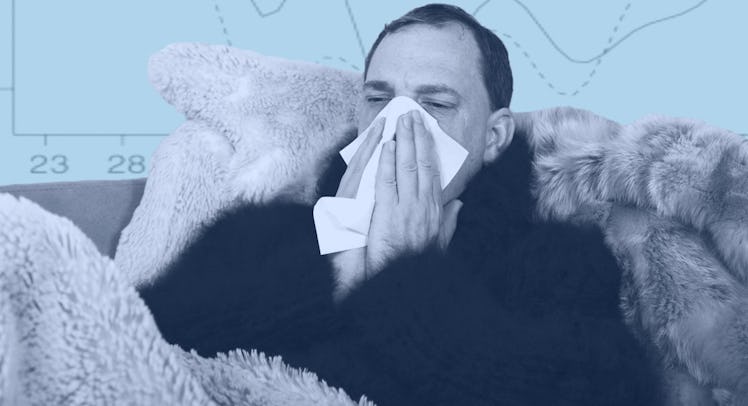Men Really Do Have Worse Cold And Flu Symptoms Than Women, Study Says
You're not necessarily weak — but your immune system might be.

Time to stop up on elderberry syrup, dad: When a man’s flu symptoms seem to slow him down more than the women in his life, it’s not because he’s soft. It’s because he’s weak — or at least his immune system is — when it comes to fighting off common viruses, according to a new literature review in the British Medical Journal.
“Based on my review of existing research on the topic, the evidence points towards men having weaker immune systems, and therefore, a weaker immune response when faced with a common viral respiratory illness such as the common cold or the flu,” study author Kyle Sue, a clinical assistant professor at Memorial University of Newfoundland in Canada, told Fatherly.
Sue, writing for the humorous but rigorous BMJ Christmas edition, says his findings suggest “man flu” might be a real condition. “The BMJ Christmas edition is meant for serious research but with a lighthearted lens,” Sue says. “I’ve made use of some common stereotypes to get a few laughs.”
There’s certainly precedent for Sue’s humorous claim. Preliminary animal and in-vitro studies suggest that male and female immune systems are influenced by hormones, and that higher levels of estrogen found in females may be linked to stronger immune systems. Research on humans also shows that high levels of testosterone can depress a man’s immune system, and population data suggests that men are at a higher risk of hospitalization and death than women, even after accounting for heart disease, cancer, respiratory disease, and renal disease. Meanwhile, there’s evidence that flu vaccines are not as effective in men, and a survey of 2,121 adults found that men take three days on average to recover from the flu. Women are usually fine after a day and a half.
For his literature review, Sue searched research databases including PubMed and Google Scholar for terms referring to gender and a battery of common cold and flu symptoms. He found 32 studies that gauged how men and women fare with the flu. “I was surprised how many of the studies I cited were done by women,” Sue says. “I would have expected men to be more interested in the topic.”
Overall, the 32 studies combined indicate that men have weaker immune systems, which results in weaker immune responses. Unfortunately, this “immunity gap” extends to other respiratory illnesses other than the flu, like the common cold. And for these mainstream ailments, the difference in symptoms mostly comes down to hormonal differences between men and women. So if your flu symptoms are worse because you have too much testosterone, it’s not because you’re a baby. Scientifically speaking, it’s because you’re just that manly. Likewise, the testosterone dip for new fathers may also help to curb man-flu symptoms temporarily, though that has yet to be studied directly, Sue notes.
Weaker immune systems aren’t all bad. When it comes to surviving pandemic infections that humans are not used to, such as Spanish Flu or H1N1, women have higher death rates. Paradoxically, this may be due to their stronger immune systems setting off inflammatory cytokine storms that overwhelm the body in an attempt to rid it of unfamiliar diseases. And besides, the research is far from definitive. Scientists will need more than 32 studies before they can suss out the immune differences between men and women.
But Sue maintains that his research is at least definitive enough to give men studies to fall back on when they’re feeling under the weather and short on sympathy. “In fact,” he says. “Men, when criticized, should be able to point to the evidence in my research to defend themselves.”
This article was originally published on